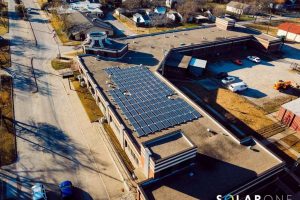
Commercial Solar Frequently Asked Questions (FAQ)
For many years, Solar One has been supporting different businesses across the US, helping them become more sustainable and profitable. Obviously, throughout the years and with our experience, we have had a lot of questions concerning switching to commercial solar, so we decided to compile a list of the most common ones, covering from the latest technology, the benefits of solar, the several incentives and financing available, potential savings, tips on maintenance and warranties and more. Find out how valuable it can be switching to a cleaner, more sustainable energy source like solar, and how much it could benefit your business.
Here at Solar One, our team is fully knowledgeable and committed to finding the best solar solution for your business, exploring the latest renewable technologies available, as well as the most ideal storage system or even EV charging options that your business could benefit from. Keep reading this article to find out more.
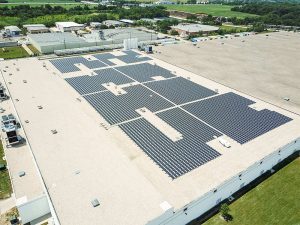
FAQs About Commercial Solar Energy Systems
Why Should My Company Switch To Solar Energy?
The environmental benefits from switching to solar are well-known already, however not many are aware that there are also excellent financial benefits that make commercial solar energy a lucrative investment too. There are several incentives and programs available that can assist with offsetting electricity and operation costs, so it’s clear to see why switching to solar energy can be extremely beneficial to a wide variety of businesses, such as agricultural, industrial or commercial.
How Can Solar Energy Financially Benefit My Business?
Obviously using solar energy instead of normal electricity taken from the grid can hugely reduce the ever-rising electricity bills any business can incur. This can generate huge savings throughout the life of the installed solar system, which can make the business more competitive in the market. Across the USA and the whole world, electricity rates have been rapidly increasing as the years go by, much faster than predicted. Switching to commercial solar energy can guarantee your electricity rates will not hike up.
How Does Switching To Commercial Solar Benefit The Environment?
It is widely known that solar energy, like other sustainable energy sources, is extremely beneficial to the environment. Various businesses are now decreasing their gas emissions thanks to their solar energy systems that help them offset their electricity use. This obviously decreases dangerous air pollutants and particulate matter that are generated through normal electricity consumption, that have been proven incredibly detrimental to humans health and can cause long-term health damages. That’s why it has become so important for business to make this essential switch to a cleaner, safer energy source like solar.
Is It Worth For My Business To Invest In Solar Panels?
The answer is definitely yes! A solar panel system is certainly a great investment for any business that wants to commit to a greener, safer future and cut down electricity costs and reliance on utility companies. Not only that, but if your business can take advantage of the profitable incentives available, such as the ITC (investment tax credit), you are effectively generating a positive cash flow thanks to the high ROI and shorter payback period.
How Does A Commercial Solar Panel Work?
PV (Photovoltaic) solar panels for commercial purposes are much bigger than those for residential purposes as they are designed to collect much more sunlight throughout the day, turning it into DC (direct current) electricity. The majority of businesses are actually run on AC (alternating current) electricity, so inverters are essential to convert the DC electricity into AC to be used.
Will My Commercial Panels Still Generate Power Even When There’s No Sunlight?
Sadly not, as solar energy is only generated when sunlight is collected, so during the day. Please note that external factors like cloudy weather, or shade can affect the solar energy production. Thankfully, if a business has a storage system, they will be able to store the extra unused electricity to use during those times that none can be produced.
However, a recent development by a great team of engineers at Stanford University has been able to create a solar panel cell that can produce energy even at night, by including a thermoelectric generator.
How Much Will I Spend To Maintain My Commercial Solar System?
Thankfully solar panel systems don’t have any moving parts and they are built with strong, tempered glass, which means they don’t really require a lot of maintenance throughout their lifetime, which is usually between 25 and 35 years. As a rule of thumb, Tier-1 solar panels will only lose roughly 15% of their efficiency over that period.
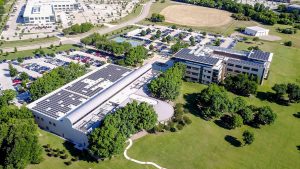
Frequently Asked Questions For Commercial, Industrial & Agricultural Businesses – Electricity Cost & Use
How Much Commercial Electricity Should I Be Spending Per Month If Considering A Switch To Solar?
We recommend businesses that spend more than $3,000 per month on electricity to seriously consider switching to a more sustainable energy source like solar. It is clear to see that utility companies are increasingly raising their costs, so the sooner a business decides to switch to commercial solar, the better and more cost-effective it will be.
How Do I Check My Business’ Monthly Electricity Costs?
Please refer to your business’ utility electricity bill to check how much it is paying every month. We have seen an increase of up to 30% in the last two years for commercial, industrial and agricultural businesses throughout most of the US..
Will I Still Have To Pay A Utility Bill For My Electricity After Switching To Commercial Solar?
Your business could significantly lower its utility bills with a commercial solar energy system, instead of relying solely on electricity coming from the grid. To ensure that your business is fully independent from the grid, we recommend investing in an energy storage system, otherwise you may still receive a smaller electricity bill. Either way, investing in commercial solar energy ensures that these ever-rising electricity costs will not affect your business.
How Can I Save Money By Investing In Energy Storage For My Commercial Solar System?
Although switching to commercial solar will reduce your electricity bills on a monthly basis, some businesses who need higher energy to meet its demand may still have to rely on utility companies to make up for the difference. However energy storage systems are there to help to solve this problem, thanks to a process called Peak Shaving. Basically your solar system would be using reserve batteries to fulfill the energy demands, instead of using the grid to make up for the difference in energy needed and still incur in demand charges.
What Is NEM (Net Energy Metering)?
NEM2 (Net Energy Metering) is what utility companies have been using to buy energy solar produced by consumers’ solar panel systems. It basically allows energy customers to sell back the ‘extra’ solar energy produced to the utility companies. There is a new version of this program currently being developed, NEM3, which will see the value of this exported energy being reduced.
Will I Be Able To Go Completely Off-Grid With Commercial Solar?
Although it is technically possible to do so and work completely ‘off-grid’, it is significantly more expensive to design a system that does not rely at all on the grid. This is due to the safeguards and backups already in place with a utility company. The vast majority of commercial solar energy systems are still tied to the grid, so they can access electricity when they are unable to produce electricity, like at night.
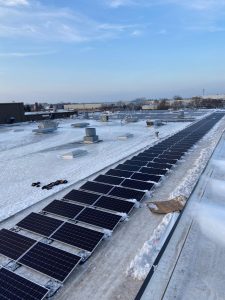
Frequently Asked Questions On Financing Options & Incentives
What Financial Incentives Can I Take Advantage Of When Switching to Commercial Solar?
Solar One prides itself on having helped hundreds of commercial customers find the best way to finance the initial cost of their solar energy system through various solutions such as CPACE (commercial property assessed clean energy financing), lease-to-own financing, bank financing and PPA (power purchase agreements).
What Are The Best Solar Energy Rebates and Incentives Available?
Obviously the most important and talked-about incentive available for commercial solar is the ITC (investment tax credit), which lets businesses claim 30% of the solar system off their taxes, which has recently been extended until 2032.
Can You Tell Me More About The Solar ITC (Solar Investment Tax Credit)?
The Solar ITC, which has currently been increased to 30% and extended until 2032, is a tax credit that is worked out from the total cost of your commercial solar system. For example, if you paid $250,000 for your system, you can claim back $75,000 in taxes for the following year. This credit will then be reduced to 26% in 2033 and down to 22% in 2034.
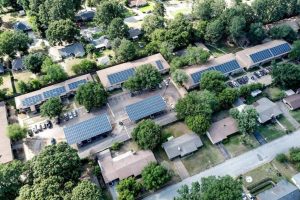
Frequently Asked Questions on Property – Commercial, Industrial & Agricultural Solar
Can Commercial Solar Affect The Value Of My Property?
The answer is definitely yes, commercial solar can considerably increase property value, as well as generating a positive cash flow through electricity bill savings.
How Do I Find Out If Commercial Solar Is A Good Fit For My Building?
If you don’t lease the property and fully own it, your rooftop surface is more than 100,000 square feet, pay taxes on your business income, and your business can finance a system or qualifies for federal financing then yes, your building could be suitable for commercial solar.
H3 Will My Roof’s Warranty Be Affected If I Install Commercial Solar?
There are several ways to install a roof-mounted solar panel system and we are always more than happy to work with your roofer or suggest a certified one to ensure there are no issues with maintaining the current roof warranty. And obviously if for some reason you need your roof replaced, we can work with your roofer to ensure the solar system is included in the new warranty.
How Is Solar One Able To Tell If A Roof Can Hold the Weight Of A Commercial Solar Panel System?
As every solar module weighs roughly 54lbs, we tend to evenly spread out the weight and stick to a maximum of 5lbs per square foot. We ensure our team also runs a careful due diligence, whether the roof is newer or older. We conduct thorough engineering plans that include structural load calculations that show the suitability of a commercial solar system on your business’ roof.
Can I Replace Or Repair My Roof In 10/15 Years Once The Solar System Has Been Installed?
Most repairs can be conducted without having to remove the solar panels as certified roofers can work around them easily through walkways and space available. However, in certain instances, they may need to work on an area that has modules on them or need the roof replaced. We always recommend coating for this reason as it can extend your roof’s life by more than 20 years.
If you need to repair an area that has solar modules on it, we recommend removing the modules so the roofer can carry out the repair, and then put back the module. Keep in mind that this is quite a costly procedure, roughly $250 per module as they need to be disconnected from the wiring and the racking and then obviously reinstalled. If only carrying out a coating, then ensure you are using a roofer that has experience with solar panels as they can easily work around the modules left in place on the roof.
Will There Be A Lot Of ‘Traffic’ On The Roof?
Not really, unless a replacement or repair is needed. We recommend washing panels once or twice a year, and that’s pretty much it in terms of ‘traffic’ on the roof.
Have More Questions? Get In Touch!
Here at Solar One we love to hear from potential customers and help them make a life-changing, sustainable decision like commercial solar. We have more than two decades of experience in helping local businesses reduce their costs while helping the environment.